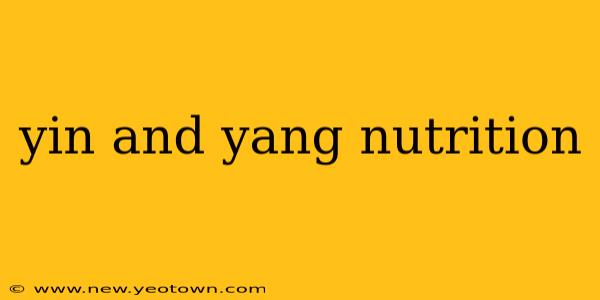The ancient Chinese philosophy of Yin and Yang offers a holistic approach to understanding the world, including our relationship with food. Rather than focusing on individual nutrients, Yin Yang nutrition emphasizes the energetic qualities of foods and how they interact within the body to promote balance and harmony. It’s not about restriction, but about mindful eating and creating a personalized dietary approach that supports your unique constitution. Think of it as a delicious journey towards optimal well-being, rather than a rigid diet.
Imagine a cool, still lake reflecting the sun – that's Yin. Now picture a raging river, full of energy and movement – that’s Yang. In nutrition, this translates to the energetic qualities of foods. Yin foods are generally cooling, moist, and dark, while Yang foods are warming, dry, and light. Finding the right balance between these energetic qualities is key to vibrant health.
What are Yin and Yang Foods?
It’s important to understand that the Yin and Yang classification isn't about nutritional content in the Western sense. Instead, it focuses on the energetic impact of food on the body.
Yin Foods: These foods are typically associated with cooling and calming effects. They often include:
- Fruits: Watermelon, berries, most tropical fruits.
- Vegetables: Leafy greens, cucumbers, zucchini.
- Drinks: Juices (especially fruit juices), herbal teas (like chamomile).
Yang Foods: These foods tend to be warming and stimulating. They include:
- Meats: Beef, lamb, chicken.
- Spices: Ginger, garlic, chili peppers.
- Vegetables: Root vegetables like carrots, potatoes, and onions.
- Grains: Quinoa, brown rice (in moderation).
How to Balance Yin and Yang in Your Diet?
The goal isn't to rigidly categorize every food, but to understand the energetic qualities and strive for a balance that suits your body's needs. Think of it as a seesaw – you don't want to be all the way on one side or the other, but in the sweet spot in the middle.
Consider these factors:
- Seasonality: Pay attention to the seasons. In warmer months, you may naturally gravitate towards more Yin foods, while colder months may call for more warming Yang foods.
- Your constitution: Some individuals may naturally have a more Yin or Yang constitution. Observe how your body responds to different food combinations and adjust accordingly. Are you prone to feeling cold or fatigued? You might need more warming Yang foods. Do you have a tendency towards inflammation or overheating? More cooling Yin foods may be beneficial.
- Your activity level: A highly active individual may need more Yang-rich foods to fuel their energy levels, while someone with a more sedentary lifestyle may benefit from a diet leaning more towards Yin.
- Your digestion: Proper digestion is crucial. If you consistently experience indigestion, you may need to adjust your balance of Yin and Yang foods to support your digestive system.
What are the benefits of Yin Yang nutrition?
Practicing Yin Yang nutrition can lead to a variety of benefits, including:
- Improved digestion: Balancing Yin and Yang can support healthy digestion and alleviate digestive issues.
- Increased energy levels: By consuming the right balance of foods, you can regulate your energy levels throughout the day.
- Better sleep: Yin Yang nutrition can help regulate your sleep cycles and improve sleep quality.
- Improved emotional balance: This holistic approach can help you feel more grounded and emotionally balanced.
- Strengthened immunity: By strengthening your body’s natural energy flow, it can enhance its ability to fight off illness.
Is Yin Yang Nutrition Right For Me?
Yin Yang nutrition is a personalized approach. It’s not a one-size-fits-all diet. The best way to determine if it's right for you is to experiment and observe how your body responds. Starting with small changes and gradually incorporating more Yin and Yang principles into your diet can be a gentle and effective way to find your perfect balance.
How can I learn more about Yin and Yang Nutrition?
There are many resources available to help you learn more about Yin and Yang nutrition. Consult a qualified practitioner of Traditional Chinese Medicine (TCM) for personalized guidance. They can assess your individual constitution and provide tailored recommendations. Books and online resources can also offer valuable information, but always prioritize guidance from a qualified professional.
Remember, the journey to balanced health is a personal one. Yin Yang nutrition is a tool to support that journey, encouraging mindful eating and a deeper understanding of your body's unique needs. It's about finding harmony, not restriction, and creating a sustainable approach to nourishment that truly supports your well-being.

